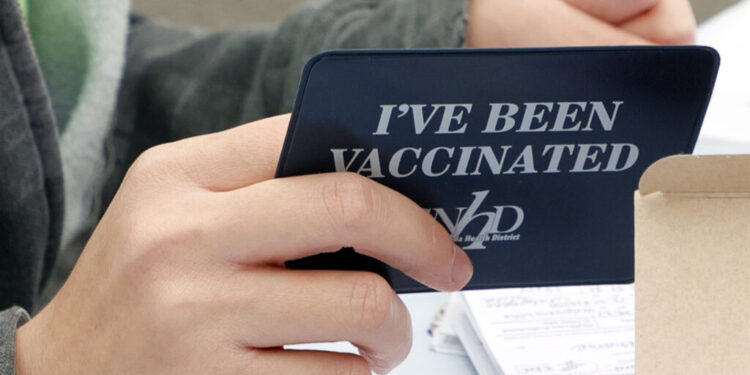The current forecast for vaccine policy in the United States is, to put it mildly, stormy. With Robert F. Kennedy Jr. as the nominee for secretary of Health and Human Services and a slate of other names — including Mehmet Oz, Jay Bhattacharya, and Florida Surgeon General Joseph A. Ladapo — floated as possible appointees, public health advocates are rightly concerned about the future of evidence-based public health policies.
I understand the consequences of vaccine disinformation too well. When my son, Thomas, was 5 months old, I dropped him off for his second week of day care. Later that day, we got the dreaded “Dear Parents” email: A case of chickenpox in the infant classroom meant that the babies would need to quarantine at home for 28 days. Two days later, Thomas broke out with the telltale varicella rash and developed pneumonitis in his lungs. Chickenpox can be serious, but we were lucky: He did not need to be hospitalized, and he made a full recovery. This experience, which could have been prevented, inspired me to speak up for our family and others.
Six months later, I visited Maine’s State House to testify on a bill to strengthen immunization requirements. I was scarcely prepared — the hearing was overwhelmed by hundreds of anti-vaccine activists, including Del Bigtree, best known as RFK Jr.’s right-hand man during his campaign for president. Testimony lasted 13 hours, and I drove home at 2 a.m., wondering where the rest of the pro-vaccine parents were hiding.
Since then, I’ve helped to launch SAFE Communities Coalition, a bipartisan organization dedicated to advancing strong vaccine policies at the grassroots. We have 11 Families for Vaccines chapters from coast to coast, in blue states and deep red ones, and we’re growing rapidly.
That’s why I’m here to tell you that there are compelling reasons for optimism. Every day, I get to witness firsthand how pro-vaccine advocacy continues to grow stronger, better organized, and more effective than ever before.
Even though the first Trump administration was marked by political turbulence, Maine, New York, Connecticut, California, and Washington strengthened their vaccine laws. Maine removed the loophole that had left my son vulnerable, with 73% of voters electing to protect our schools from rising rates of disease. In each state, dedicated pro-vaccine advocates spoke up about the policies that protect families from deadly preventable diseases, and lawmakers listened. Even in the face of federal challenges, states can serve as a firewall for public health. It may even be the case that predicted shifts in authority from the federal government to the states provide citizen advocates the opportunity to make policy changes at home.
It’s also worth remembering that though President Trump has engaged in vaccine skepticism, he did prioritize the Covid vaccine in the pandemic. Operation Warp Speed demonstrated what’s possible when political will aligns with the public good. Though the program had significant limitations, Operation Warp Speed marshaled $18 billion in federal resources and delivered safe and effective Covid-19 vaccines in record time — a bipartisan victory for health, science, innovation, and public-private partnerships.
Furthermore, while anti-vaccine voices make headlines, the majority of Americans continue to immunize themselves and their children. We’ve been a quiet majority, but we’re finally experiencing a surge in grassroots vaccine advocacy. Parents, health care providers, community leaders, and lawmakers continue to emerge as vaccine champions, and together, we’re growing a national pro-vaccine movement.
Within days of SAFE Communities Coalition launching a campaign urging folks to contact their senators to reject RFK Jr.’s confirmation, thousands of pro-vaccine advocates from across the country responded. Influencers in pro-science parenting spaces enthusiastically shared the call to action, amplifying the message to an even wider audience.
This level of engagement would have been unimaginable a decade ago. Today’s pro-vaccine advocates are not just reactive but proactive, building coalitions and mobilizing at a scale that we firmly believe will not just rival but overtake the anti-vaccine movement.
We’ve had some significant victories in the past few years, including winning a vaccine referendum in Maine with a 73% majority voting to protect children from disease, and defeating all 39 of the anti-vaccine bills proposed in Louisiana in 2021.
Of course, we’ve also learned some tough lessons from past legislative fights. A bill in Montana would have prohibited blood donations from immunized individuals, putting the state’s lifesaving blood supply at risk. We got creative and organized a blood drive, encouraging Montanans to roll up their sleeves, get their shots, and donate blood. Every bad bill is an opportunity to make sure advocates are better prepared to respond to anti-vaccine bills with targeted local data, compelling stories, credible partners, and coordinated action. I’ve seen it happen many times – regular people are joining our ranks and learning how to advocate for the laws they believe in. As we grow, our collective voices become harder to ignore.
This preparation is critical as we anticipate new challenges at the federal and state levels. While RFK Jr.’s nomination is profoundly concerning, it has also galvanized the pro-vaccine community, creating a sense of urgency and unity that will be essential in the years ahead.
Yes, the challenges are real, and my heart breaks as we consider the real lives, careers, promising innovations, and economies that will be hurt by anticipated losses to our national infrastructure for health. But our story doesn’t end here. Pro-vaccine advocates are stronger, savvier, and more ready than ever before.
In the same way that high immunization rates shield our families and communities from the spread of disease, a united majority of pro-vaccine advocates will help protect us against the policies that threaten our collective health and well-being.
Caitlin Gilmet is the communications director for SAFE Communities Coalition, the nation’s leading pro-vaccine advocacy organization.


